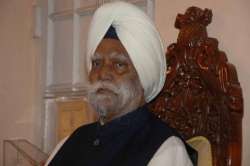Congress veteran, former Union home minister Buta Singh passes away
Prominent Dalit leader of the Congress and former Union home minister Buta Singh, who served under four prime ministers in a political career spanning over five decades, died at the AIIMS in Delhi on Saturday morning.

Prominent Dalit leader of the Congress and former Union home minister Buta Singh, who served under four prime ministers in a political career spanning over five decades, died at the AIIMS in Delhi on Saturday morning. He was 86. Singh was in a coma since October last year when he was admitted to the All India Institute of Medical Sciences (AIIMS) after he suffered a brain hemorrhage. He died around 7.10 am, his family said.
He was cremated at the Lodhi Road crematorium in the evening. A large number of Congress leaders and workers attended the cremation. His supporters earlier paid their last respects to the departed leader at his Jangpura Extension residence and at the Sri Nanaksar Gurudwara in Wazirabad, where his body was kept.
A staunch loyalist of former prime minister Rajiv Gandhi, Singh was a member of Lok Sabha for eight terms, held several positions in varied ideological dispensations at the Centre and became the Governor of Bihar in 2004.
Singh often found himself at the centre of major controversies. He was once excommunicated from the socio-religious order of the Sikhs for his alleged role in the Operation Blue Star, but was pardoned a decade later.
President Ram Nath Kovind, Vice President M Venkaiah Naidu, Prime Minister Narendra Modi and former prime minister Manmohan Singh condoled his demise.
"In the passing of Shri Buta Singh, the country has lost one of the longest serving parliamentarians with rich administrative experience. He championed the cause of the oppressed and marginalized. Condolences to his family and supporters," Kovind said in a tweet.
Naidu said, "Saddened to learn about the passing away of Shri Buta Singh Ji. He was an able administrator and parliamentarian. My heartfelt condolences to bereaved family members."
The prime minister said Singh was "an experienced administrator and effective voice for the welfare of the poor as well as downtrodden".
Former Prime Minister Manmohan Singh, in a letter to his son Arvinder Singh, described him as a leader of "high esteem" who was respected by everybody irrespective of party lines.
Manmohan Singh said, "He was a great Parliamentarian and a distinguished administrator who devoted his whole life to the service of the poor and other backward communities."
Congress leader Rahul Gandhi said Singh devoted all his life in the service of the country.
"In the demise of Sardar Buta Singh Ji, the country has lost a true public servant and a loyal leader. He devoted his entire life in the service of the country and the well-being of people, for which he will always be remembered," the former Congress chief said in a tweet in Hindi.
Condoling Singh's demise, Defence Minister Rajnath Singh said he "dedicated his life serving poor and downtrodden. He served the nation in several capacities."
Punjab Chief Minister Amarinder Singh, West Bengal CM Mamata Banerjee, Rajasthan CM Ashok Gehlot and several Union ministers also condoled Singh's demise.
Born into a humble 'mazhbi' Sikh family in Mustafapur in Punjab's Jalandhar district on March 21, 1934, Singh rose through the political ranks and went on to become the virtual No. 2 in the Rajiv Gandhi government in the late 1980s.
During his tenure as home minister, he oversaw the consecration of bricks for a Ram temple in Ayodhya in 1989 when the site was disputed and faced criticism for the dismissal of many state governments. He was considered a one-man "demolition squad" of Rajiv Gandhi who "axed" many state governments.
Before Rajiv Gandhi, Singh was close to Indira Gandhi and held several positions in her government. He also played a role in selecting the Congress's new poll symbol -- "hand" -- after the party split in 1978.
But, Singh had to pay a price for his close association with the Gandhis and his positions in the successive Congress governments -- he was excommunicated from the socio-religious order of the Sikhs in April 1985 for his role in the Operation Blue Star that caused damage to the Akal Takht, the highest temporal seat of the Sikhism.
Nearly 10 years after the events at the Golden Temple, he sought atonement and returned to the Sikh fold. In March 1994, he was granted pardon.
Pictures of him undergoing the punishment of dusting shoes, washing dishes and sweeping floors at the Golden Temple and other gurudwaras, with a plaque around his neck declaring him a sinner, went viral at the time.
In his initial political days, Singh was associated with the Shiromani Akali Dal (SAD). He joined the Congress in the early 1960s. He was first elected to the Lower House of Parliament in 1962 from Punjab. Later, he represented Rajasthan's Jalore constituency in Lok Sabha.
He switched over to the BJP briefly and became the Minister for Communications in the Atal Bihari Vajpayee cabinet in March 1998. But he had to resign soon after following his indictment in the JMM bribery case.
He, thereafter, switched back to the Congress and was made the Governor of Bihar in 2004. He had to quit as Bihar Governor after the Supreme Court was critical of his role in recommending the dissolution of the state Assembly in 2005. He resigned in 2006.
AICC general secretary KC Venugopal attended his cremation. He also laid a wreath on behalf of the Congress family. Wreaths were also laid on his body at the Lodhi Road crematorium on behalf of Congress president Sonia Gandhi and Rahul Gandhi.
"The party and nation has lost a stalwart leader today," the Congress party said.
ALSO READ | Expelled Congress MLAs Rajdeep Gowala, Ajanta Neog join BJP in Assam